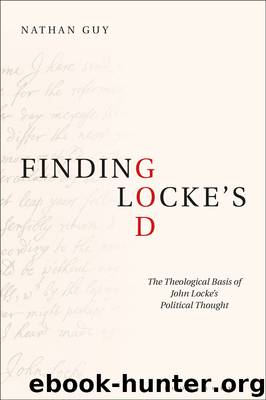Finding Locke's God by Nathan Guy;

Author:Nathan Guy;
Language: eng
Format: epub
Publisher: Bloomsbury UK
6
Revelation, Reason, and Scripture
Locke describes God and the human vocation to obey the law of nature in language consistent with (and often drawn from) Christian scripture. The question arises how dependent Locke might be for his conception of God on scripture and what would constitute “His (God’s) business” in the social and political realms. Locke’s high regard for reason and heavy emphasis in the Essay on deductive logic and empirical tests in matters relating to God and morality have led some to question Locke’s understanding of revelation in general and of scripture as revelation in particular.1 With careful attention paid to Locke’s argumentation in the RC, this chapter will show that, for Locke, revelation is not in competition with reason; instead, revelation largely clarifies, enhances, and adds grounds for obligation and motivation toward the good to which reason points. In addition, the revelation of God in scripture provides assurance that Locke’s political aims do, in fact, form a Christian political philosophy. Whether or not Locke is conscious of his dependence on scripture,2 it is clear that he relies on his conviction that God has provided revelation of Himself in scripture and this revelation—detailing a “true idea” of God—provides essential elements of Locke’s political theory.
The constitution: A model for appreciating Locke’s approach to scripture
Raymond Polin’s article on Locke’s conception of freedom summarizes the essential role of a constitution for setting boundaries and enshrining communal trust within Locke’s vision of polity. According to Polin, “one could gather the whole” of Locke’s key terms “in a single formula: the trust must be expressed under the form of a constitution, of fundamental laws, which determine the nature of the common good and the ways through which it is to be achieved.”3 Jeremy Waldron echoes these sentiments. For Locke, when a group of legislators attempts to arrive at just and fair conclusions drawn from right principles, a written constitution is far superior to applying “the light of reason” to the laws of nature.4
In this chapter, I will show that the political dynamic at work in a legislature’s reliance on a written constitution parallels in important ways the theological dynamic at work in Locke’s own commitment to the truths he believes are given in the text of scripture. Locke does not advocate any religious litmus test for a person to be admitted to the body politic; they need not assent to the witness of Christ and the apostles concerning salvation from sin through the cross. Equally, Locke is clear that scripture does not provide a blueprint for political constructions. However, as Locke lays out his political theory, he is himself bound by truths revealed in scripture and builds a theory consonant with revelation. In fact, as will be explained later, some of Locke’s central political claims result from reflection on truths revealed in scripture.
For example, Locke advocates religious toleration by the body politic precisely because it is not only “agreeable to the Gospel of Jesus Christ” to be peaceful but the fulfillment of the revealed Christian duty to show charity, rather than seeking to “exercise Lordship over” others.
Download
This site does not store any files on its server. We only index and link to content provided by other sites. Please contact the content providers to delete copyright contents if any and email us, we'll remove relevant links or contents immediately.
Changing the Questions: Explorations in Christian Ethics by Margaret Farley(770)
The Broken Image by Leanne Payne(681)
Money, Possessions, and Eternity by Randy Alcorn(589)
Reset the Heart by Tran Mai-Anh Le;(566)
Introducing Christian Ethics by Scott Rae(493)
The Year without a Purchase by Scott Dannemiller(482)
Introduction to Christian Ethics by Marshall Ellen Ott;(472)
Wholly Different: Why I Chose Biblical Values Over Islamic Values by Darwish Nonie(447)
Bioethics and the Christian Life: A Guide to Making Difficult Decisions by David VanDrunen(446)
Old Testament Ethics for the People of God by Wright Christopher J. H(436)
A Doubter's Guide to the Ten Commandments: How, for Better or Worse, Our Ideas about the Good Life Come from Moses and Jesus by John Dickson(429)
How to Keep From Losing Your Mind by Deal Hudson(392)
A Theologico-Political Treatise, and A Political Treatise by Benedict de Spinoza(390)
Be the Bridge by LaTasha Morrison & Daniel Hill & Jennie Allen(389)
The Spiritual Danger of Donald Trump: 30 Evangelical Christians on Justice, Truth, and Moral Integrity by Ronald J. Sider(363)
I Bring the Voices of My People by Chanequa Walker-Barnes(359)
Managing God's Mutual Funds by Kenneth Copeland(341)
Christianity and the New Spirit of Capitalism by Kathryn Tanner(331)
Wired for Intimacy by William M. Struthers(329)
